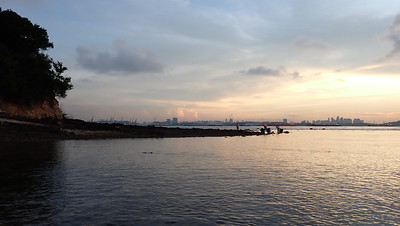We find Giant clams and other colourful reef life. I checked for mass coral bleaching. Although I saw signs of stress, I estimate only about 2% of corals hard and soft were outright bleaching.
As usual, the rest of the team made all the special finds! Two living Fluted giant clams, and one empty shell. Lots of interesting nudibranchs, flatworms, slugs and sea anemone. The Long-tailed macaques we first saw on our last survey in Jan 2023 are still there. We saw one eating the tips of the Seashore pandan in the coastal forest.
 |
| Photos by the team members. Links to their albums at the end of this post. |
 |
| Photos by the team members. Links to their albums at the end of this post. |
My mission was to check for mass coral bleaching which is expected to hit our shores soon. I have never seen a lot of hard corals on Pulau Jong since we started surveying it. Most of them are boulder shaped. Today, those on the high shores were bleaching. The rest seemed normal, although a few were pale or had pinkish shades, a sign of stress.
On our last survey in Jan 2023, I saw many large leathery soft corals colonies, an improvement over the decline we saw Since Aug 2020. Today, while there remains many medium sized colonies of a wide variety of these soft corals, I didn't see any large colonies. Most were alright, although some had pale patches. A few were bleaching and one had a 'melting' centre portion, a sign of stress.
Other cnidarians can also bleach, so I looked out for those too. There are a lot of Sea mat zoanthids here, Most that I saw seemed alright, though a few were white or oddly coloured. All the Giant carpet anemones I saw were okay. I saw some Asparagus flowery soft corals, only one was rather pale with yellowish tips. Giant clams are not cnidarians, but also rely on symbiotic algae and thus can also bleach. Fortunately, those we saw today were not bleaching. I noticed whitish speckles all across the shore, could this be due to bleaching Encrusting coralline red seaweed?
Untouched by reclamation, Pulau Jong is one of the last islands where you can find the full spectrum of coastal ecosystems that used to be found in Singapore. Coastal forest growing on natural cliffs full of native plants, along a shore with corals and marine life, as well as Sickle seagrass that sprinkle this shore.
There are also sandy areas in the intertidal, with more rocky shores far out on the long reef flat. Each of these ecosystems are homes to different animals. Nutrients and other positive interactions also occur among the ecosystems. A complete spectrum means healthier individual ecosystems.
Dubbed the 'char siew pau' island because of its cute dumpling shape, Pulau Jong has a huge reef flat that is exposed at low spring tide. This reef flat together with the domed island is said to resemble the silhouette of a Chinese sailing junk, thus 'Jong'.
What is the fate of Pulau Jong?
Pulau Jong as well as Terumbu Semakau and much of natural Pulau Semakau is slated for massive reclamation outlined recently in the Long-Term Plan Review.
The Singapore Blue Plan 2018
Pulau Semakau and nearby islands and submerged reefs have been recommended by the Singapore Blue Plan 2018 for Immediate Conservation Priority.
The Blue Plan recommends the intertidal and subtidal marine areas of Pulau Semakau and adjacent Pulau Hantu, and Pulau Jong to be designated Marine Reserve.
The Blue Plan highlights that Pulau Semakau and its associated patch reefs comprise many ecosystems: coral reefs, mangrove areas, intertidal sandflats, seagrass meadows, and coral reefs. The subtidal area of Pulau Jong is larger than the terrestrial area. Pulau Hantu is a popular dive site has seen increasing interest in the past decade due to biodiversity awareness. If protection is accorded to these three islands, zonation plans for use can be implemented to manage tourism and human impacts.
DOWNLOAD the Plan, SUPPORT the Plan! More on the Singapore Blue Plan 2018 site.
Photos by others on this survey
Jianlin Liu
Chay Hoon
Tammy Lim
Loh Kok Sheng
Che Cheng Neo
Rachael Goh
Kelvin Yong
Marcus Ng
Jonathan Tan










